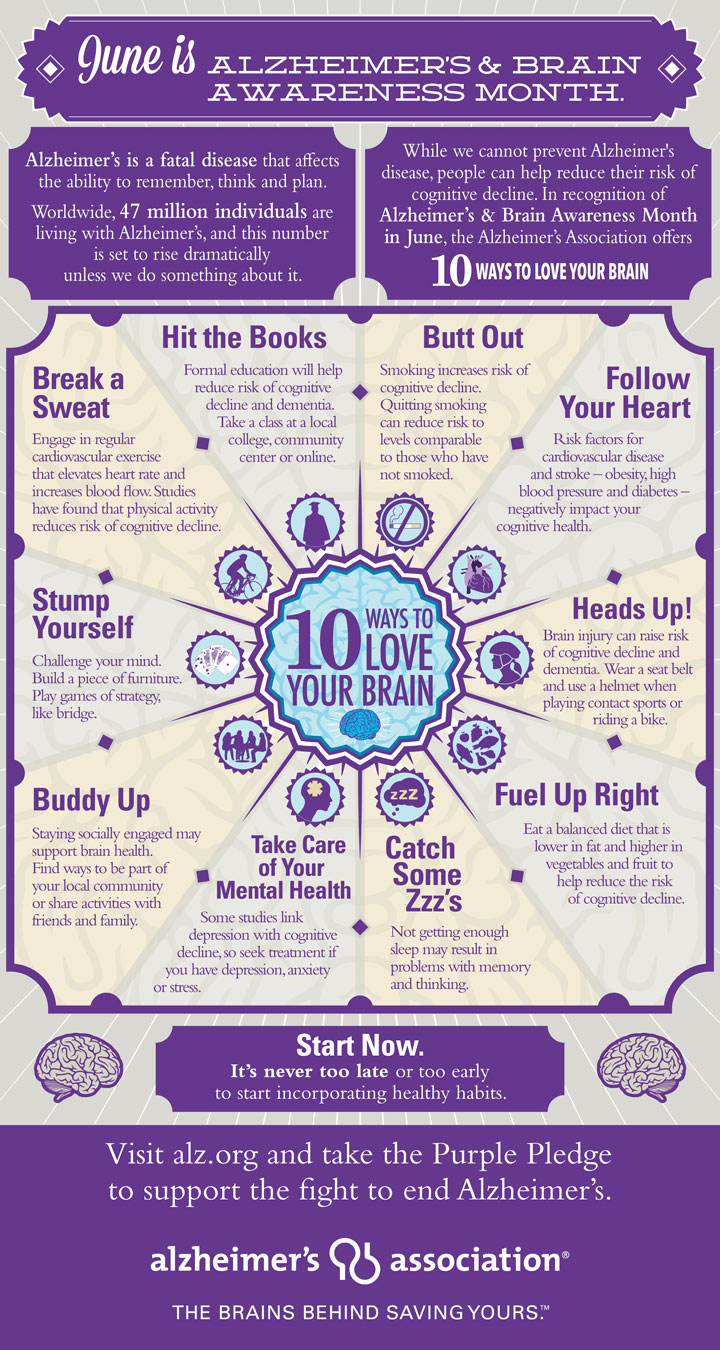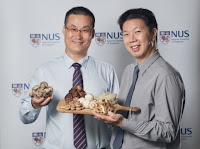The evidence is mounting: risk of cognitive decline can be significantly reduced by making key lifestyle changes. That is the conclusion of a new research summary published in Alzheimer’s & Dementia: The Journal of the Alzheimer’s Association.
“The research on cognitive decline is still evolving,” said Angela Geiger, Chief Strategy Officer, Alzheimer’s Association. “But there are actions people can take. Certain healthy behaviors known to combat cancer, cardiovascular disease and diabetes may also reduce the risk of cognitive decline. These include staying mentally active, engaging in regular physical activity and eating a heart-healthy diet that benefits your body and your brain. There is also some evidence people may benefit from staying socially engaged with friends, family and the community.”
Take the Purple Pledge
With this in mind, the Alzheimer’s Association offers 10 Ways to Love Your Brain, tips that may reduce the risk of cognitive decline.
- Break a sweat. Engage in regular cardiovascular exercise that elevates your heart rate and increases blood flow to the brain and body. Several studies have found an association between physical activity and reduced risk of cognitive decline.
- Hit the books. Formal education in any stage of life will help reduce your risk of cognitive decline and dementia. For example, take a class at a local college, community center or online.
- Butt out. Evidence shows that smoking increases risk of cognitive decline. Quitting smoking can reduce that risk to levels comparable to those who have not smoked.
- Follow your heart. Evidence shows that risk factors for cardiovascular disease and stroke – obesity, high blood pressure and diabetes – negatively impact your cognitive health. Take care of your heart, and your brain just might follow.
- Heads up! Brain injury can raise your risk of cognitive decline and dementia. Wear a seat belt, use a helmet when playing contact sports or riding a bike, and take steps to prevent falls.
- Fuel up right. Eat a healthy and balanced diet that is lower in fat and higher in vegetables and fruit to help reduce the risk of cognitive decline. Although research on diet and cognitive function is limited, certain diets, including Mediterranean Diet, MIND Diet and Mediterranean-DASH (Dietary Approaches to Stop Hypertension), may contribute to risk reduction.
- Catch some Zzz’s. Not getting enough sleep due to conditions like insomnia or sleep apnea may result in problems with memory and thinking.
- Take care of your mental health. Some studies link a history of depression with increased risk of cognitive decline, so seek medical treatment if you have symptoms of depression, anxiety or other mental health concerns. Also, try to manage stress.
- Buddy up. Staying socially engaged may support brain health. Pursue social activities that are meaningful to you. Find ways to be part of your local community – if you love animals, consider volunteering at a local shelter. If you enjoy singing, join a local choir or help at an afterschool program. Or, just share activities with friends and family.
- Stump yourself. Challenge and activate your mind. Build a piece of furniture. Complete a jigsaw puzzle. Do something artistic. Play games, such as bridge, that make you think strategically. Challenging your mind may have short and long-term benefits for your brain. (Continued below video…)
“While the adoption of all of these habits is important in influencing brain health, if it seems overwhelming, start with one or two changes and build on them,” said Geiger. “While some changes may be challenging, others can be fun. Try to choose activities and foods you enjoy.”
In addition to reducing your risk of cognitive decline, these tips may also reduce your risk of dementia. Evidence for reducing risk of dementia is currently strongest in relation to formal education and the avoidance of head injury; other tips show indication of possibly reducing risk. Alzheimer’s disease, the most common form of dementia, is one of the nation’s largest public health crises.












